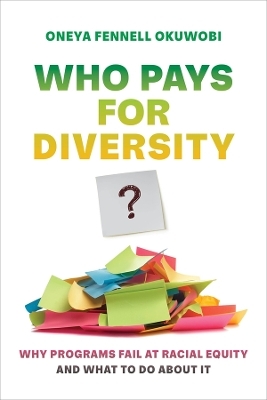
Who Pays for Diversity?
Why Programs Fail at Racial Equity and What to Do about It
Seiten
2025
University of California Press (Verlag)
978-0-520-39221-2 (ISBN)
University of California Press (Verlag)
978-0-520-39221-2 (ISBN)
- Noch nicht erschienen (ca. März 2025)
- Versandkostenfrei
- Auch auf Rechnung
- Artikel merken
How diversity initiatives harm employees of color by turning them into workplace commodities.
Diversity programs are under attack. Should those interested in racial justice fight to keep them, or might there be another way forward? Who Pays for Diversity? reveals the costs that employees of color pay under current programs by having their racial identities commodified to benefit white people and institutions. Oneya Fennell Okuwobi proposes fresh and thoughtful ways to reorient these initiatives, move beyond tokenism, and authentically center marginalized employees.
Drawing on accounts of employees from across the workplace spectrum, from corporations to churches to universities, Who Pays for Diversity? details how the optics of diversity programs undermine employees' competence while diminishing their well-being and workplace productivity. Okuwobi argues that diversity programs have been a costly detour on the path to racial justice, and getting back on track requires solutions that provide equity, dignity, and agency to all employees, instead of defending the status quo.
Diversity programs are under attack. Should those interested in racial justice fight to keep them, or might there be another way forward? Who Pays for Diversity? reveals the costs that employees of color pay under current programs by having their racial identities commodified to benefit white people and institutions. Oneya Fennell Okuwobi proposes fresh and thoughtful ways to reorient these initiatives, move beyond tokenism, and authentically center marginalized employees.
Drawing on accounts of employees from across the workplace spectrum, from corporations to churches to universities, Who Pays for Diversity? details how the optics of diversity programs undermine employees' competence while diminishing their well-being and workplace productivity. Okuwobi argues that diversity programs have been a costly detour on the path to racial justice, and getting back on track requires solutions that provide equity, dignity, and agency to all employees, instead of defending the status quo.
Oneya Fennell Okuwobi is Assistant Professor of Sociology at the University of Cincinnati.
| Erscheint lt. Verlag | 18.3.2025 |
|---|---|
| Zusatzinfo | 1 table |
| Verlagsort | Berkerley |
| Sprache | englisch |
| Maße | 140 x 216 mm |
| Themenwelt | Sachbuch/Ratgeber ► Gesundheit / Leben / Psychologie |
| Sozialwissenschaften ► Ethnologie | |
| Sozialwissenschaften ► Soziologie | |
| ISBN-10 | 0-520-39221-3 / 0520392213 |
| ISBN-13 | 978-0-520-39221-2 / 9780520392212 |
| Zustand | Neuware |
| Haben Sie eine Frage zum Produkt? |
Mehr entdecken
aus dem Bereich
aus dem Bereich
selbstbewusst für den eigenen Körper entscheiden : Sex, Zyklus, …
Buch | Hardcover (2024)
Insel Verlag
CHF 41,95
für naturheilkundliche, physiotherapeutische und ästhetische …
Buch | Softcover (2024)
Urban & Fischer in Elsevier (Verlag)
CHF 55,95
Buch | Softcover (2024)
Tyrolia (Verlag)
CHF 38,90


